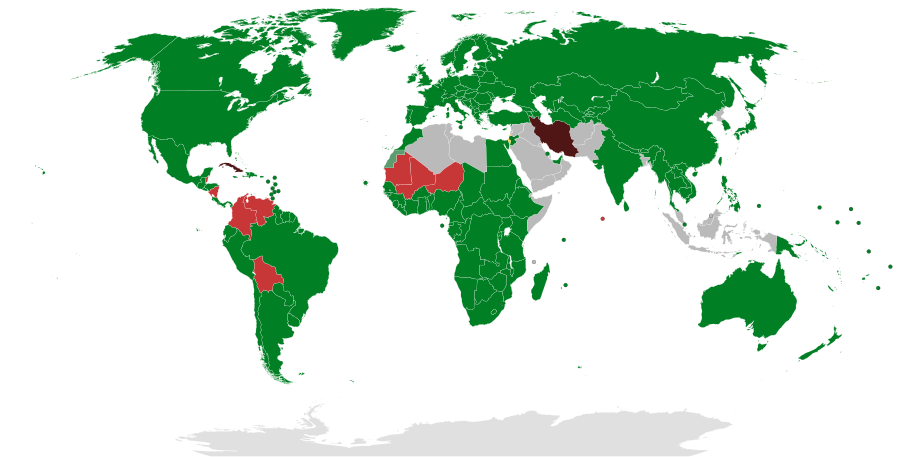Palestine Recognition: Key To Indonesia-Israel Diplomatic Relations

Table of Contents
Indonesia's Stance on Palestine: A Deep-Rooted Commitment
Indonesia's support for Palestine is deeply rooted in its national identity and foreign policy. The Indonesian government, alongside significant portions of the Indonesian public, views the Palestinian struggle for self-determination as a moral imperative. This commitment is consistently demonstrated through Indonesia's active role in international organizations such as the Organization of Islamic Cooperation (OIC). Indonesia consistently votes against Israel in international forums and employs strong rhetoric condemning Israeli occupation policies in the Palestinian territories. This unwavering stance is influenced by a confluence of religious, political, and historical factors, reflecting a strong anti-Israel sentiment among certain segments of the population. Furthermore, Indonesia's support extends to significant financial and humanitarian aid provided to Palestine, firmly supporting a two-state solution based on pre-1967 borders.
- Consistent voting against Israel in international forums.
- Strong rhetoric against Israeli occupation of Palestinian territories.
- Financial and humanitarian aid provided to Palestine.
- Support for a two-state solution based on pre-1967 borders.
- Active participation in OIC initiatives related to Palestine.
The Obstacles to Indonesia-Israel Relations
The diplomatic deadlock between Indonesia and Israel stems from a complex interplay of factors. The most significant hurdle is undoubtedly the strong anti-Israel sentiment present within segments of the Indonesian population. This sentiment, fueled by decades of conflict and media portrayals, creates a significant political constraint for any Indonesian government considering normalization. A shift towards recognizing Israel could lead to a considerable domestic political backlash, potentially impacting the ruling party's popularity and stability. Furthermore, there are genuine concerns that normalizing relations with Israel could be perceived as undermining the Palestinian struggle for self-determination, a position deeply held by many Indonesians. The absence of significant immediate economic incentives also plays a role, making the perceived costs of normalization outweigh the perceived benefits for some.
- Strong anti-Israel sentiment among segments of the Indonesian population.
- Potential domestic political backlash against normalization with Israel.
- Concerns about undermining the Palestinian struggle for self-determination.
- Lack of significant economic incentives for Indonesia to normalize relations.
The Potential Benefits of Recognizing Israel (for Indonesia)
Despite the obstacles, recognizing Israel could yield substantial benefits for Indonesia. Access to Israeli technological advancements in fields like agriculture, water management, and medicine could significantly bolster Indonesia's development efforts. Increased trade and investment opportunities would stimulate economic growth, creating jobs and boosting the Indonesian economy. Furthermore, strengthening strategic partnerships with Israel in areas such as security and defense could enhance regional stability and improve Indonesia's international standing, particularly within Western alliances. Improved relations with the US and other Western nations could also lead to increased diplomatic cooperation and access to resources and opportunities.
- Access to Israeli technological advancements in agriculture, water management, and medicine.
- Increased trade and investment opportunities.
- Strengthened regional security cooperation.
- Improved relations with the US and other Western nations.
A Phased Approach to Recognition: A Possible Solution?
A gradual normalization, rather than an abrupt shift, could mitigate the risks associated with recognizing Israel. A phased approach, focusing on mutual benefits and incorporating confidence-building measures, could prove more palatable to the Indonesian public and political landscape. This could involve establishing low-level diplomatic contacts or opening trade offices as a preliminary step before full diplomatic recognition. Such a gradual process would allow for careful monitoring of public opinion and adjustments to the strategy based on the evolving dynamics. Conditional recognition, tied to tangible progress towards a just and lasting two-state solution that secures Palestinian rights, could further address concerns about abandoning the Palestinian cause.
Conclusion
Indonesia's unwavering support for Palestine is commendable, but a recalibration of its approach towards Israel, potentially involving a phased recognition, could offer significant benefits without compromising its commitment to the Palestinian cause. The key lies in strategically planning any such move and communicating it effectively to the Indonesian public, addressing concerns and highlighting potential benefits. Further discussion and analysis are crucial to fully understand the implications of Palestine recognition on Indonesia-Israel diplomatic relations. Let's engage in a thoughtful conversation about the potential for strategic partnerships and a more nuanced approach to achieving lasting peace in the Middle East, while ensuring the rights of the Palestinian people are respected. The path towards improved Indonesia-Israel relations might be paved through a carefully considered approach to Palestine recognition.

Featured Posts
-
 Felbecsuelhetetlen Erteku Holmik Szazezreket Erhetnek A Lakasodban Levo Targyak
May 29, 2025
Felbecsuelhetetlen Erteku Holmik Szazezreket Erhetnek A Lakasodban Levo Targyak
May 29, 2025 -
 The Ultimate Guide To Air Jordan Releases June 2025
May 29, 2025
The Ultimate Guide To Air Jordan Releases June 2025
May 29, 2025 -
 Annuals And Perennials Understanding The Differences For Garden Planning
May 29, 2025
Annuals And Perennials Understanding The Differences For Garden Planning
May 29, 2025 -
 Meet The Singers Competing In Eurovision 2025
May 29, 2025
Meet The Singers Competing In Eurovision 2025
May 29, 2025 -
 Ramalan Cuaca Jawa Timur Antisipasi Hujan Lebat Dan Petir 29 Maret 2024
May 29, 2025
Ramalan Cuaca Jawa Timur Antisipasi Hujan Lebat Dan Petir 29 Maret 2024
May 29, 2025
Latest Posts
-
 Controversy Surrounds New Beatles Cast Understanding The White Boy Of The Month Criticism
May 31, 2025
Controversy Surrounds New Beatles Cast Understanding The White Boy Of The Month Criticism
May 31, 2025 -
 Beatles Casting Announcement Sparks Debate Examining The White Boy Of The Month Reaction
May 31, 2025
Beatles Casting Announcement Sparks Debate Examining The White Boy Of The Month Reaction
May 31, 2025 -
 The Beatles Cast Revealed A Look At The White Boy Of The Month Controversy
May 31, 2025
The Beatles Cast Revealed A Look At The White Boy Of The Month Controversy
May 31, 2025 -
 Podrobnosti Za Kontuziyata Na Grigor Dimitrov
May 31, 2025
Podrobnosti Za Kontuziyata Na Grigor Dimitrov
May 31, 2025 -
 Vzstanovyavane Na Grigor Dimitrov Sled Kontuziya
May 31, 2025
Vzstanovyavane Na Grigor Dimitrov Sled Kontuziya
May 31, 2025
